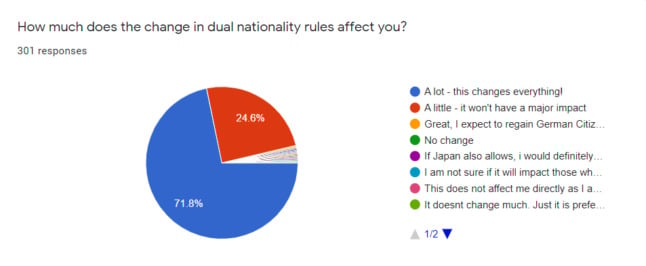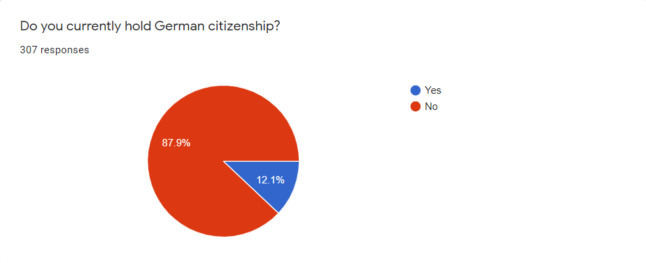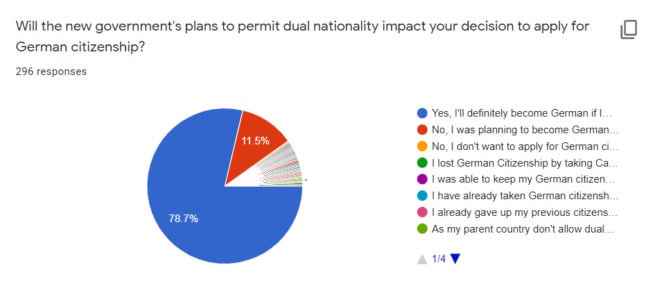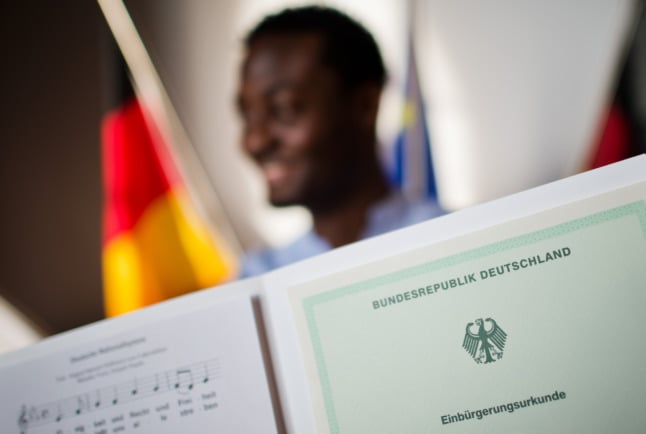'I finally feel at home': How Germany's planned changes to citizenship laws affect foreigners

As Germany stands poised to permit multiple nationalities, The Local readers have aired their views about how the change will affect them. The verdict? Many feel more comfortable settling in the country and building a life here.
Ahead of the September 2021 elections, it was no secret that Germany was on the brink of a huge political shift.
Angela Merkel, who had occupied the country's top job through 16 years of crises and coalitions, had announced her retirement from politics; both sides of the so-called 'Grand Coalition' of the SPD and CDU/CSU had signalled that they were done with the partnership, and the country was faced with major upheaval from the pandemic and disastrous effects of climate change.
What many people failed to predict, however, was just how significant the election would be for foreigners in Germany, those with migrant backgrounds and Germans abroad.
In the coalition pact unveiled in November, the SPD, Greens and FDP announced plans to slash barriers to naturalisation one by one, from lowering the residency requirement from eight years to five (or even three with "exceptional integration") to permitting the holding of multiple citizenships.
It's still unclear when the changes to citizenship law will come into force - though politicians have told us it's a "priority" for this year - but what is clear is that it will make a significant difference to lives of millions of foreigners who have decided to make Germany their home.
Speaking to The Local after the changes were announced, several readers told us they welcomed the change - but thought that it was "long overdue".
"It's been a long time coming," said 47-year-old Greg from Karlsruhe. "It was very backward to only allow single citizenship."
READ ALSO: When will Germany relax its dual citizenship laws?
Like many other respondents, Greg said he had hired a lawyer in the hope of getting an exception to the dual nationality rules - but ultimately it would have cost too much to pursue the case in court.
"Now I can finally get German citizenship after 15 years and I'm very happy about that," he told us.
Of the more than 300 people who responded to our survey, around 72 percent said the change would make a huge difference to their lives, while a further 25 percent said it would affect them "a little".
 Source: The Local
Source: The Local
Others pointed out that, though they were personally happy about the change, the impact went well beyond first-generation migrants alone.
"We live in a world that is more global than ever, and this decision is going to open many doors - not just for the people who want to live in Germany, but for Germany itself." said Brendan Lies, 31, who lives in Munich.
"But the ones I'm the most happy for are the many Turkish families who, until now, have had to struggle with completely unnecessary bureaucracy even generations later. This change is convenient for me, but for them, I think it's more a matter of justice and equality."
'No longer a second-class citizen'
An overwhelming proportion of respondents to our survey - 88 percent - said they didn't yet have German citizenship.

Source: The Local
Many said they had been put off from applying by the fact that they would have had to renounce their old passport. A significant number said they feared losing the right to visit their family and care for their ageing parents back home.
Of the 37 people who said they did have a German passport, 66 percent had renounced their previous nationality already, while a lucky 34 percent had been able to get dual nationality, either through an exception or because their original nationality was an EU one.
Of the people who weren't yet 'German', 78 percent said they would "definitely" apply for citizenship once the rules had changed, while 11.5 percent had been already been planning to apply - even if they had to give up their previous nationality.

Source: The Local
The reasons for wanting to do so were varied, though many people brought up benefits such as voting rights and freedom of movement through the EU.
"I could finally vote after living in Germany for 30 years and having no say in what is going on," said 48-year-old Laurie Schideman who lives in Frankfurt.
David Oswald, 49, who lives in Berlin, said the right to participate in elections was important to him as well.
"As a British person I’ve felt disenfranchised as I can’t vote here in Germany," he explained.
"It's amazing," said John Hignite, 31, who lives in Rodgau in Hesse. "I've lived in Germany for 10 years (all of my adult life), but haven't been able to participate in elections."
Another respondent who gave up their previous citizenship said they were excited at the prospect of regaining the right to have a say in the place they grew up.
"I shall definitely re-acquire my old citizenship back and avail myself of my rights to stay longer, to own property and also vote and be politically active in my homeland," they said.
Beyond the explicit benefits that come with German citizenship, however, many people pointed to the less tangible - but no less important - sense that their complex loyalties and identities would finally be recognised.
"I can officially show that I have loyalties to both Germany and the UK and should not be treated as a third rate citizen by authorities," said 61-year old Kim Dallas, who lives in Saxony-Anhalt.
Alex, 65, who lives in Hamburg, was also looking forward to having a greater sense of belonging.
"I will no longer have to feel second class by falling on the wrong side of the EU/Non-EU divide, which crops up everywhere," he said.
READ ALSO: In limbo: Why Germany’s reform of dual citizenship laws can’t come soon enough
'This changes everything'
In a powerful counterpoint to the argument that dual nationality creates split allegiances, many of our readers said that gaining German citizenship would help them feel much more integrated once they gained the passport.
Some people told us they'd found new motivation to improve their German language skills, while others said it would inspire them to commit to the country on a long-term basis.
"This really changes everything for me and my family," said 34-year-old Berliner Mamadou. "I now really want to stay in Germany and fully integrate knowing that I will have the right to vote and live like a proper German."
"It is definitely the best way forward," said Elini, 33, who lives in Berlin. "Becoming a national of the country you live in is absolutely something that can change how you view that country, and how accepted you feel in that society."
Others agreed that dual nationality would help people forge stronger emotional ties to Germany.

A newly naturalised German smiles at his citizenship ceremony in Germany. Photo: picture alliance / dpa | Julian Stratenschulte
"As a matter of principle, I don't believe that there is a real argument for forcing people to only have one citizenship," one anonymous respondent told us.
"Doing that implies forcing some sort of weird 'loyalty' to only one place, while it is human to feel connected to more than one place and to want to be part of both - while totally understanding that when you're in Germany of course the German rules and law should and will apply to you."
"I can keep my identity, and yet fully commit and exist in the country I chose to live, pay taxes, work," said 26-year-old Daniel C. who lives in Berlin. "I can belong to my new home while not abandoning my old one."
Dmitry, 44, who lives in Munich, echoed this view.
"After gaining German citizenship, I would finally feel at home in Germany, knowing that I and my children would have all rights and all protections connected with it," he said.
Though not everyone we surveyed was happy about the change, a large number expressed feelings of relief that their voices had finally been heard and excitement about starting a new chapter of German life.
This feeling of finally belonging was summarised by David Oswald in Berlin.
"Dual nationality doesn’t prevent integration," he said. "It merely strengthens the bond between citizens."
READ ALSO: EXPLAINED: How I got German citizenship – and how you can too
*******
Thanks to everyone who shared their comments with us. Keep an eye on the Local Germany for more stories on what the planned changes mean for readers.
If there’s anything you’d like to ask or tell us about our coverage, please feel free to get in touch.
Comments (1)
See Also
Ahead of the September 2021 elections, it was no secret that Germany was on the brink of a huge political shift.
Angela Merkel, who had occupied the country's top job through 16 years of crises and coalitions, had announced her retirement from politics; both sides of the so-called 'Grand Coalition' of the SPD and CDU/CSU had signalled that they were done with the partnership, and the country was faced with major upheaval from the pandemic and disastrous effects of climate change.
What many people failed to predict, however, was just how significant the election would be for foreigners in Germany, those with migrant backgrounds and Germans abroad.
In the coalition pact unveiled in November, the SPD, Greens and FDP announced plans to slash barriers to naturalisation one by one, from lowering the residency requirement from eight years to five (or even three with "exceptional integration") to permitting the holding of multiple citizenships.
It's still unclear when the changes to citizenship law will come into force - though politicians have told us it's a "priority" for this year - but what is clear is that it will make a significant difference to lives of millions of foreigners who have decided to make Germany their home.
Speaking to The Local after the changes were announced, several readers told us they welcomed the change - but thought that it was "long overdue".
"It's been a long time coming," said 47-year-old Greg from Karlsruhe. "It was very backward to only allow single citizenship."
READ ALSO: When will Germany relax its dual citizenship laws?
Like many other respondents, Greg said he had hired a lawyer in the hope of getting an exception to the dual nationality rules - but ultimately it would have cost too much to pursue the case in court.
"Now I can finally get German citizenship after 15 years and I'm very happy about that," he told us.
Of the more than 300 people who responded to our survey, around 72 percent said the change would make a huge difference to their lives, while a further 25 percent said it would affect them "a little".

Others pointed out that, though they were personally happy about the change, the impact went well beyond first-generation migrants alone.
"We live in a world that is more global than ever, and this decision is going to open many doors - not just for the people who want to live in Germany, but for Germany itself." said Brendan Lies, 31, who lives in Munich.
"But the ones I'm the most happy for are the many Turkish families who, until now, have had to struggle with completely unnecessary bureaucracy even generations later. This change is convenient for me, but for them, I think it's more a matter of justice and equality."
'No longer a second-class citizen'
An overwhelming proportion of respondents to our survey - 88 percent - said they didn't yet have German citizenship.

Of the 37 people who said they did have a German passport, 66 percent had renounced their previous nationality already, while a lucky 34 percent had been able to get dual nationality, either through an exception or because their original nationality was an EU one.
Of the people who weren't yet 'German', 78 percent said they would "definitely" apply for citizenship once the rules had changed, while 11.5 percent had been already been planning to apply - even if they had to give up their previous nationality.

The reasons for wanting to do so were varied, though many people brought up benefits such as voting rights and freedom of movement through the EU.
"I could finally vote after living in Germany for 30 years and having no say in what is going on," said 48-year-old Laurie Schideman who lives in Frankfurt.
David Oswald, 49, who lives in Berlin, said the right to participate in elections was important to him as well.
"As a British person I’ve felt disenfranchised as I can’t vote here in Germany," he explained.
"It's amazing," said John Hignite, 31, who lives in Rodgau in Hesse. "I've lived in Germany for 10 years (all of my adult life), but haven't been able to participate in elections."
Another respondent who gave up their previous citizenship said they were excited at the prospect of regaining the right to have a say in the place they grew up.
"I shall definitely re-acquire my old citizenship back and avail myself of my rights to stay longer, to own property and also vote and be politically active in my homeland," they said.
Beyond the explicit benefits that come with German citizenship, however, many people pointed to the less tangible - but no less important - sense that their complex loyalties and identities would finally be recognised.
"I can officially show that I have loyalties to both Germany and the UK and should not be treated as a third rate citizen by authorities," said 61-year old Kim Dallas, who lives in Saxony-Anhalt.
Alex, 65, who lives in Hamburg, was also looking forward to having a greater sense of belonging.
"I will no longer have to feel second class by falling on the wrong side of the EU/Non-EU divide, which crops up everywhere," he said.
READ ALSO: In limbo: Why Germany’s reform of dual citizenship laws can’t come soon enough
'This changes everything'
In a powerful counterpoint to the argument that dual nationality creates split allegiances, many of our readers said that gaining German citizenship would help them feel much more integrated once they gained the passport.
Some people told us they'd found new motivation to improve their German language skills, while others said it would inspire them to commit to the country on a long-term basis.
"This really changes everything for me and my family," said 34-year-old Berliner Mamadou. "I now really want to stay in Germany and fully integrate knowing that I will have the right to vote and live like a proper German."
"It is definitely the best way forward," said Elini, 33, who lives in Berlin. "Becoming a national of the country you live in is absolutely something that can change how you view that country, and how accepted you feel in that society."
Others agreed that dual nationality would help people forge stronger emotional ties to Germany.

"As a matter of principle, I don't believe that there is a real argument for forcing people to only have one citizenship," one anonymous respondent told us.
"Doing that implies forcing some sort of weird 'loyalty' to only one place, while it is human to feel connected to more than one place and to want to be part of both - while totally understanding that when you're in Germany of course the German rules and law should and will apply to you."
"I can keep my identity, and yet fully commit and exist in the country I chose to live, pay taxes, work," said 26-year-old Daniel C. who lives in Berlin. "I can belong to my new home while not abandoning my old one."
Dmitry, 44, who lives in Munich, echoed this view.
"After gaining German citizenship, I would finally feel at home in Germany, knowing that I and my children would have all rights and all protections connected with it," he said.
Though not everyone we surveyed was happy about the change, a large number expressed feelings of relief that their voices had finally been heard and excitement about starting a new chapter of German life.
This feeling of finally belonging was summarised by David Oswald in Berlin.
"Dual nationality doesn’t prevent integration," he said. "It merely strengthens the bond between citizens."
READ ALSO: EXPLAINED: How I got German citizenship – and how you can too
*******
Thanks to everyone who shared their comments with us. Keep an eye on the Local Germany for more stories on what the planned changes mean for readers.
Join the conversation in our comments section below. Share your own views and experience and if you have a question or suggestion for our journalists then email us at [email protected].
Please keep comments civil, constructive and on topic – and make sure to read our terms of use before getting involved.
Please log in here to leave a comment.